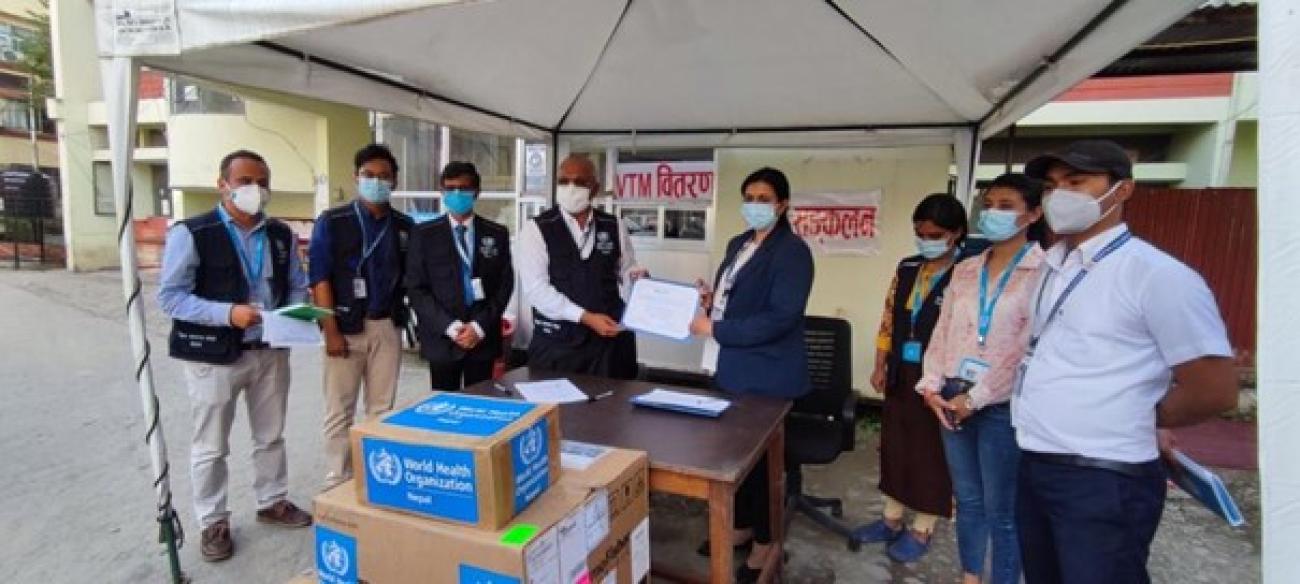As part of the efforts to build in-country capacity for pathogen genetic sequencing, the National Public Health Laboratory (NPHL) led the establishment of a National Pathogen Genetic Sequencing Consortium with support from WHO, Country Office for Nepal.
The biotechnology department of Tribhuvan University, the Dhulikhel Hospital, Epidemiology and Disease Control Division (EDCD), Central Veterinary Laboratory, Nepal Academy of Science and Technology (NAST), Walter Reed/AFRIMS Research Unit Nepal (WARUN), and WHO, Country Office for Nepal, are the members of the consortium.
As of 6 December, the consortium which was set up in March 2021 and grew operational in October 2021 has sequenced around 100 genomes of SARS-CoV-2. WHO Nepal had provided a sequencing machine, reagents, and technical assistance to NPHL.
“Having the capacity to conduct gene sequencing tests within the country has enabled us to detect any new variant in a timely manner and to make quick and informed public health decisions,” said Dr Runa Jha, Director of NPHL. “The spotlight is on COVID-19 now, but we must seize this opportunity to build sustainable infrastructure for the future.”
As Nepal did not have an in-country capacity for genetic sequencing early in the pandemic, WHO Nepal through coordination with WHO Regional Office for South-east Asia and headquarters facilitated to provide genetic sequencing service through the WHO laboratory at School of Public Health, Hong Kong, Special Administrative Region of China, under the global Influenza Surveillance and response system (GISRS). To further increase the number of genomes sequenced and reduce the turnaround time, WHO also facilitated a collaboration between NPHL and the New Delhi-based Institute of Genomics and Integrated Biology (IGIB) resulting in the country sequencing around 50 genomes per month. A second collaboration between NPHL and the New Variant Assessment Platform (NVAP) at UK health Security Agency (previously known as Public Health England UK) has now enabled the country to sequence around 150 genomes per month.
Viruses continue to evolve through changes in their genome. SARS-CoV-2, the causative agent of COVID-19, is no different. Several SARS-CoV-2 variants with genetic modifications have emerged during this pandemic. Genetic sequencing remains the most reliable way to detect these variants. This pandemic has shown how sequencing enabled countries to rapidly identify SARS-CoV-2 variants and institute appropriate public health responses.
"It is encouraging to note that Nepal achieved this milestone at a time when the health system is under much duress due to the ongoing pandemic. Setting up of this consortium is a step in the right direction towards enhancing surveillance and detection in the country and ultimately contribute to strengthening the health system towards being better prepared to respond to emergencies and outbreaks of any type,” said Dr Rajesh Sambhajirao Pandav, WHO Representative to Nepal.
The facility will enable the country to do genomic surveillance of other pathogens including Influenza Virus; antimicrobial drug-resistant bacteria; Mycobacterium tuberculosis; Plasmodium species (Malaria parasite); and zoonotic, high threat, and emerging pathogens. Further, it will help the country to rapidly identify and/or confirm high threat pathogens of public health concerns including hitherto unknown pathogens. Hence, the in-country genetic sequencing capacity will directly contribute to the country’s compliance with IHR 2005.
The Consortium, led by NPHL, with the membership of EDCD, Department of Biotechnology (TU), Dhulikhel Hospital, WARUN Lab, has received technical, financial, and logistics support from partners including WHO, Washington University, and FHI 360.
The consortium enabled Nepal to detect and confirm the latest SARS-CoV-2 variant of concern, Omicron, in the country with an impressive turnaround time of five days.



